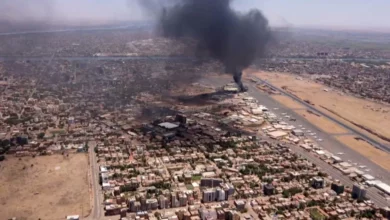Juba/Khartoum–South Sudan's army said northern warplanes bombed its territory Monday, after fighting in the border state of Southern Kordofan spread across the ill-defined north-south border.
The northern army has been battling southern-aligned troops in Southern Kordofan, the north's main oil state, since 5 June. Humanitarian organizations fear a mounting death toll, although few casualties have been confirmed so far.
South Sudan is due to become independent on 9 July.
Analysts see Southern Kordofan as a flashpoint in the build-up to the split because it is home to thousands of fighters who sided against Khartoum during the last civil war.
The southern army accused the northern military of bombing its territory in Unity state Friday and again Monday.
"There has been another bombing of the south. It was this morning, at the same location (as Friday), at Jau in Unity state. It was more Antonovs from Khartoum," southern military spokesman Philip Aguer told Reuters.
"We are in defensive positions and continue to monitor what they are doing."
A spokesman for the northern military was not immediately available to comment.
CIVILIANS FLEE
More than 53,000 people have fled fighting – including bombardments and artillery shelling – in Southern Kordofan, the United Nations estimated Monday.
The UN Office for the Coordination of Humanitarian Affairs (OCHA) said its partners had reported the "burning of tukuls, looting of humanitarian assets and emergency relief stocks, and the presence of land mines" in the state capital Kadugli.
"As the security situation shows no sign of improvement, the number of displaced civilian populations who are in urgent need of relief assistance is increasing with unconfirmed reports of more than 53,000 people displaced," it said in a statement.
The United Nations previously estimated between 30,000 and 40,000 may have fled Kadugli alone.
The OCHA statement said fighting "has spread to Pariang County in Unity State, southern Sudan."
Officials from the northern and southern ruling parties have traded blame over who started the fighting in Southern Kordofan, which has since spread across the state.
Leaders in the northern branch of the south's dominant Sudan Peoples' Liberation Movement (SPLM) said it began when the northern army tried to disarm fighters. The northern army has blamed southern-aligned armed groups for provoking the clashes.
The north's ruling National Congress Party Sunday warned the south against supporting what it describes as a "rebellion" in the state.
The southern military says the fighters in Southern Kordofan are no longer part of its army, despite sharing a name and historical ties.
Southerners voted to secede in a January referendum, the culmination of a 2005 peace deal that ended decades of north-south civil war. That conflict cost some two million lives.
The two sides have yet to settle a number of issues, such as where to draw the common border and how to divide oil revenues.
The north's President Omar Hassan al-Bashir and the south's President Salva Kiir continued talks over unresolved issues ahead of the split in the Ethiopian capital of Addis Ababa on Monday.




